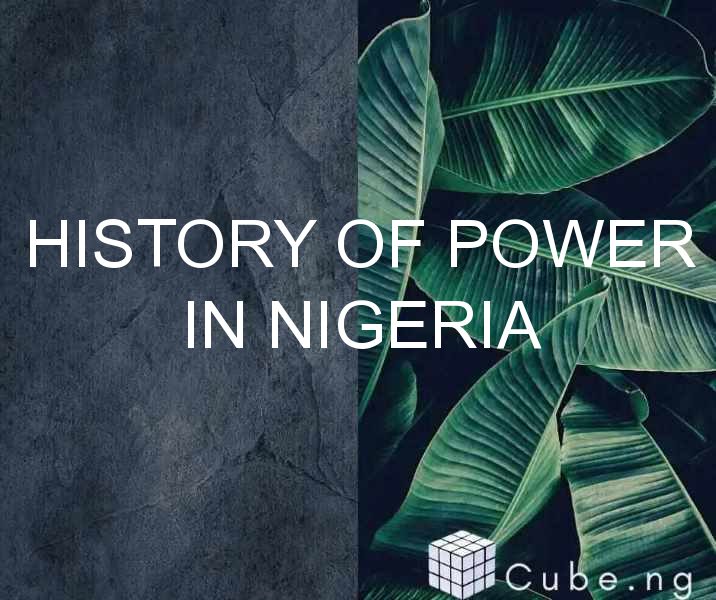History of Power in Nigeria: From Pre-Colonial Times to Present Day
Nigeria is one of the most populous countries in Africa and one of the largest economies on the continent. The country has a complex history of power, which has been shaped by different factors, including colonialism, ethnicity, and religion. Understanding the history of power in Nigeria is essential for gaining insights into the country's current political and social landscape. This article provides a comprehensive overview of the history of power in Nigeria, starting from pre-colonial times to present-day.
Pre-Colonial Times: The Emergence of Kingdoms and Empires
Nigeria has a rich pre-colonial history, characterized by the emergence of powerful kingdoms and empires. The earliest known civilization in Nigeria is the Nok culture, which flourished between 1000 BC and 300 AD. The Nok culture was known for its advanced ironworking, terracotta sculptures, and agricultural practices. Other notable pre-colonial empires in Nigeria include the Benin Empire, the Oyo Empire, and the Kanem-Bornu Empire.
The Benin Empire was one of the most powerful empires in the pre-colonial era, with a well-organized political system and a sophisticated artistic tradition. The Oyo Empire, on the other hand, was known for its military prowess and its domination of trade routes across West Africa. The Kanem-Bornu Empire was located in the northeastern part of Nigeria and was a major center for Islamic scholarship and trade.
Colonialism and the Emergence of Modern Nigeria
The arrival of European colonial powers in Nigeria marked a significant turning point in the country's history of power. The British colonized Nigeria in the late 19th century, and the country became a British protectorate in 1901. The colonial period was characterized by the exploitation of natural resources, forced labor, and the imposition of a foreign culture and political system.
During the colonial period, Nigeria was divided into three regions: the Northern Region, the Western Region, and the Eastern Region. The three regions were governed separately and had different political and economic systems. The British colonial authorities favored the Northern Region, which was predominantly Muslim, and invested more resources in the region. This led to resentment from the other regions, which felt marginalized.
Independence and the Struggle for Power
Nigeria gained independence from British colonial rule on October 1, 1960. The country became a federal republic in 1963, with a constitution that provided for a president, a prime minister, and a bicameral legislature. The first prime minister of Nigeria was Sir Abubakar Tafawa Balewa, who led the country until 1966.
The post-independence period was characterized by political instability, ethnic tensions, and military coups. The first military coup in Nigeria took place in January 1966, led by a group of young army officers who overthrew the democratically elected government. The coup was followed by a counter-coup in July 1966, which led to the deaths of several political leaders, including the first military head of state, Major General Johnson Aguiyi-Ironsi.
Military Rule and the Struggle for Democracy
Nigeria experienced a series of military coups and counter-coups in the 1970s and 1980s, which led to the consolidation of military rule. Military rule was characterized by human rights abuses, corruption, and economic mismanagement. However, Nigeria also experienced significant economic growth during the military era, due to the country's oil wealth.
The struggle for democracy in Nigeria gained momentum in the 1990s, with the emergence of civil society groups and pro-democracy movements. The military government of General Ibrahim Babangida announced a transition to civilian rule in 1993, but the results of the presidential election were annulled, leading to widespread protests and strikes. The military government of General Sani Abacha took over in 1993 and ruled until his sudden death in 1998.
The Fourth Republic: Democracy and its Challenges
Nigeria's fourth republic began in 1999, with the election of Olusegun Obasanjo as president. The fourth republic has been characterized by a return to democracy, economic reforms, and attempts to tackle corruption and insecurity. However, the country still faces significant challenges, including ethnic tensions, religious conflicts, corruption, and insecurity.
The current president of Nigeria is Muhammadu Buhari, who was elected in 2015 and re-elected in 2019. Buhari's administration has made efforts to tackle corruption and insecurity, but the country still faces significant challenges, including the Boko Haram insurgency in the northeastern part of the country, and ethnic and religious conflicts in different parts of the country.
Conclusion
The history of power in Nigeria is complex and has been shaped by different factors, including colonialism, ethnicity, and religion. Nigeria's pre-colonial kingdoms and empires laid the foundation for the emergence of a modern Nigerian state, which has experienced significant political and social changes over the years. The struggle for democracy in Nigeria has been long and difficult, but the country has made progress in recent years. However, Nigeria still faces significant challenges, and the future of the country's political and social landscape remains uncertain.
FAQs
Q1. What was the first civilization in Nigeria?
A1. The Nok culture was the earliest known civilization in Nigeria, which flourished between 1000 BC and 300 AD.
Q2. When did Nigeria gain independence?
A2. Nigeria gained independence from British colonial rule on October 1, 1960.
Q3. Who was the first military head of state in Nigeria?
A3. Major General Johnson Aguiyi-Ironsi was the first military head of state in Nigeria.
Q4. Who is the current president of Nigeria?
A4. Muhammadu Buhari is the current president of Nigeria.
Q5. What are some of the challenges facing Nigeria?
A5. Nigeria faces significant challenges, including ethnic tensions, religious conflicts, corruption, and insecurity.




